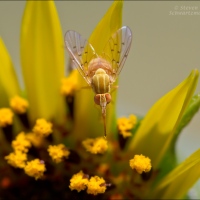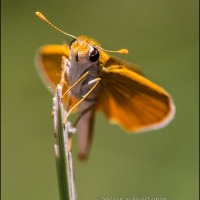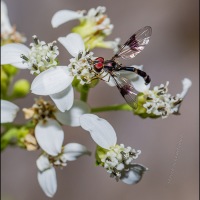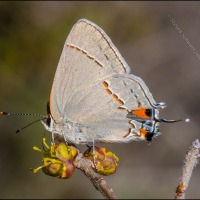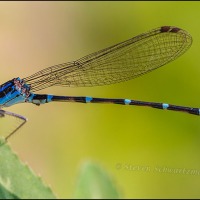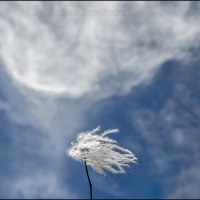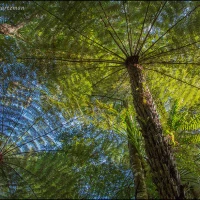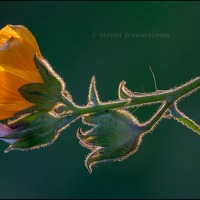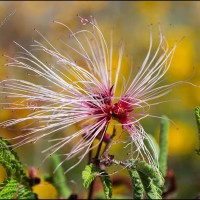Archive for February 2022
Looking back less distantly, more icily
Yesterday’s two posts looked back 7 and 56 years. Today’s post looks back 23 days to Austin’s Bull Creek District Park, where I went hunting for icicles and came home with a good photographic catch.
❄️
❄️ ❄️ ❄️
❄️
Check out the article “Ukrainian Women Bring Back Traditional Floral Crowns To Show National Pride.”
It includes 14 photographs of elaborate floral headdresses.
© 2022 Steven Schwartzman
“Lilacs”
In 1912 my father, Jack (Jacob) Schwartzman, was born in Vinnytsia, a town then under Russian control in the part of eastern Europe that is now Ukraine. In the 1920s his family escaped from the tyranny of the Soviet Union and came to America to be free. Upon his arrival here he spoke Russian but not a word of English. He learned quickly and soon became a craftsman of his new language.
The tyranny now engulfing Ukraine makes this a right moment for a poetic essay that my father published in the spring of 1966, when we weren’t even half-way through the original Cold War. Now that we’ve entered a second one, the essay is as timely as it was 56 years ago. Feel free to repost this in a spirit of solidarity.
Solomon and Anna Schwartzman in eastern Europe in 1923
with their younger son Isidore and older son Jack (Jacob).
“Lilacs”
Originally published in 1966 by Jack Schwartzman (1912–2001).
We were fleeing the land of my birth, and my spirits sank low as I saw for the last time the old familiar sights. The stars were shining brightly that night; the fragrant aroma of Spring caused my youthful heart to beat fast; and I desperately longed to stay there forever.
Everywhere, the smell of lilacs was in the air. Everywhere, there were lilacs, lilacs, lilacs. It seemed as if the entire town was permeated with the scent of lilacs.
To this day, I cannot think of Russia without smelling lilacs; to this day, I cannot catch a whiff of lilacs without thinking of my native land.
My parents, my younger brother, and I were hurrying to the “contraband” carriage. We entered in silence, and huddled in the darkness. The driver whipped the air above the horses, and suddenly, we were off . . . off to a land uncertain . . . off to a destiny unknown. Our hearts were melancholy; our thoughts were bitter.
And everywhere, the smell of lilacs reached us, and the fragrance was intoxicating.
On flew the horses, on, on, onwards through the night. Backwards slid the houses, the trees, the river; backwards rushed the dreams, the memories, the hopes, the yearnings of youth. On sped the future; backwards fled the past.
How I longed to seize the escaping vistas; how I desired to hold on to the vanishing views of my childhood! The stars were resplendently bright and glimmering; the chirping noises of the night were symphonic and melodious. I have never before — nor ever since — felt such a deep “belonging,” such a feeling of being part of God’s universe, such a “responding to” the music of the night. As we drove on, I saw grandeur disappearing before my eyes. I felt sadness rushing in to fill the vacuum of my heart.
And everywhere, the everlasting scent of lilacs greeted us, and the aroma was overwhelming.
And I thought to myself: How is it possible, in Russia, a land celebrated for its dreamers of liberty — Pushkin, Lermontov, Gogol, Turgenev, Dostoyevsky, Tolstoy — that such a terrible enslavement should exist? How is it possible that in the birthplace of Moussorgsky and Tchaikovsky, where once strummed the plaintive balalaika, now whined unceasingly the shrill bullets; where once gaily tiptoed the lovely ballerina, now grimly trod the heavy boot of the Red conqueror?
And I thought to myself: Every nation on earth has produced its poets and dreamers and musicians; every nation on earth has spat forth its demagogues and debauchers and destroyers. On the same spot, the sun may shine brightly; on the same spot, the skies may pour forth a deluge of hail and devastation.
And I thought to myself: Whether under the tyranny of the Tsar or the dictatorship of the Commissar, the voice of liberty will, nevertheless, always be heard. In camps, in prisons, in hovels, in trenches, in palaces, in hospitals, in offices, in mansions, in fields, in towns, in “contraband” carriages, and in all the Siberias of the world — the song of freedom can never be silenced; the spark of hope can never be extinguished.
And I thought to myself: Men are men the world over, be they black or white or yellow or brown or red; be they Christians or Jews or Moslems or Hindus or Confucianists; be they royalists or anarchists or revolutionists or humanists or Communists; be they Frenchmen or Americans or Indians or Tartars or Russians; be they poets or soldiers or prisoners or musicians or politicians.
And I thought to myself: How wonderful it would be if the world of men were to accept diversity, and to welcome it! The earth is ablaze with the colors of flowers and fruits and foods and customs and languages and men. All things are different; therefore, all things are alike in their various magnificence.
And I thought to myself: The salvation of man lies in his ability to harness his dreams; in his capacity to capture the stars; in his endeavor to hear the eternal music of the spheres.
And I thought to myself: Someday, the land of Russia will be free: free, not because of the hocus-pocus of some political manifestation or some economic transmutation or some ritualistic-religious hodge-podge — but free because of the innermost ability of man to see the visage of God, and to understand the reason for man’s own existence on earth. When the land of Russia — and the entire earth for that matter — shall be genuinely free, it shall be free because man is able to understand that his destiny lies in himself.
And I leaned out of the carriage, and took a deep breath. The breeze that greeted me was full of the promise of Spring; the stars shone brightly — more brightly than I had ever seen them shine before; the sound of horses’ hoofs was rhythmic and lulling; the night was cloaked with the sparkling splendor of God.
And as the horses, the carriage, and the people in it drove on to their destiny, I stole a glance at my mother. Sitting next to me, she too was staring into the night. Even in the darkness, I could see her face — and I saw that her eyes were bright with tears.
On flew the carriage, on, on, onwards through the night. The scent of lilacs was intoxicating.
Jack Schwartzman in New York City in 2001.
© 2022 Steven Schwartzman
New Zealand: More from Matakatia Bay
Yesterday’s post showed photographs taken exactly seven years earlier, on the last full day of our initial visit to New Zealand. Those three views were landscapes seen from the Matakatia Bay side of the Whangaparaoa Peninsula a little north of Auckland.
The final pictures I took that afternoon—and the ones that most excited me aesthetically—were abstractions showing colors and forms on the shore at Little Manly Beach. Some of those photographs have shown up in posts since 2015. Now here are three more for your delectation.
✪
✪ ✪ ✪
✪
We [men and women] work side by side, and some of us imagine that because we are equal under the law, we are also the same. We are and should be equal under the law. But we are not the same—despite what some activists and politicians, journalists and academics would have us believe. There seems to be comfort, for some, in the idea of sameness, but it is a shallow comfort at best. What if the best surgeon in the world was a woman, but it was also true that, on average, most of the best surgeons were male? What if the top ten pediatricians were women? Neither scenario provides evidence of bias or sexism, although those are possible explanations for the observed patterns. In order to ensure that bias or sexism is not predictive of who does what work, we should remove as many barriers to success as possible. We should also not expect that men and women will make identical choices, or be driven to excel at identical things, or even, perhaps, be motivated by the same goals. To ignore our differences and demand uniformity is a different kind of sexism. Differences between the sexes are a reality, and while they can be cause for concern, they are also very often a strength, and we ignore them at our peril.
That’s much-needed sanity from A Hunter-Gatherer’s Guide to the 21st Century: Evolution and the Challenges of Modern Life, by Heather Heying and Bret Weinstein. You can also watch many presentations by them on their Dark Horse podcasts.
© 2022 Steven Schwartzman
New Zealand: Matakatia Bay
Seven years ago today, on the last afternoon of our first fabulous trip to New Zealand,
I took pictures from the Matakatia Bay side of the Whangaparaoa Peninsula a little north of Auckland.
From that vantage point I photographed the coastal bluff shown in the top picture, the seastack
known as Kotanui or Frenchman’s Cap* shown in the middle picture, and Rangitoto Island.
* Due to persistent supply chain problems, New Zealand has had a chronic shortage of apostrophes in proper names. I’ve graciously supplied the apostrophe that was lacking.
✪
✪ ✪ ✪
✪
For some years now I’ve been calling for a United Nations 2.0. Reasons for jettisoning the old organization include those that I gave in my December 31 commentary: “Starting on January 1, 2022, a staggering 68.1% of the UN Human Rights Council will be dictators and other serial human rights abusers. Despite UN Watch’s detailed report on their gross abuses, Qatar, Cameroon, Eritrea, Kazakhstan and Somalia were all elected in October to the UN’s top human rights body, joining China, Cuba, Russia, Libya, Pakistan and Venezuela.” And “in an April 2021 secret ballot, the UN’s Economic and Social Council elected Iran’s gender apartheid regime to a 4-year term on its Commission on the Status of Women, the ‘principal global intergovernmental body exclusively dedicated to the promotion of gender equality and the empowerment of women.’” The article that detailed those abuses included seven others.
Now comes the Russian dictator’s invasion of Ukraine. The current United Nations was unable to do anything about it before or after—didn’t really even seem interested in trying. That ought to be impetus enough for the creation of a new United Nations that no despotic countries will be allowed to join.
At the same time, all civilized nations should expel every Russian diplomat and no longer allow any flights or ships from Russia to land in their countries.
© 2022 Steven Schwartzman
A new part of Walnut Creek
Austin’s Walnut Creek meanders from northwest to southeast for 20 miles before emptying into the Colorado River. On February 19th we walked along a new (to us) portion of the creek adjacent to the western branch of the Copperfield Nature Trail. The flow of water over bedrock beguiled some abstract pictures out of me. Patterns just a few feet apart differ substantially.
✶
✶ ✶
✶ ✶ ✶
✶ ✶
✶
My commentary from February 12th about oil and gas became all the more relevant this week when the dictator of Russia sent armies into Ukraine to take over that country. The American president, in collaboration with European countries, imposed economic sanctions that will effectively do nothing. That’s because dictators easily outlast financial sanctions; look how many decades the dictators in Cuba and Iran and North Korea have survived in spite of sanctions.
One effective measure that the United States and Europe could have taken was to cut Russia off from the world’s SWIFT system, which lets countries interchange money with one another. The Europeans wouldn’t go along with that move because they’re so heavily dependent on Russia for oil and gas, which Russia would stop selling to them in retaliation for getting cut off from SWIFT. The United States could supply Europe with oil and gas—except that the current American administration has done everything it could since its very first day in office to strangle our country’s oil and gas production, including canceling the Keystone XL pipeline that would have brought in oil from Canada. In 2020 we were energy-independent; just a year later we weren’t. In the 14 months since the current régime took over, gasoline here has risen to its highest price in years, and some analysts are predicting that the war in Ukraine and its aftermath will drive prices even higher.
In Biden’s address to the world yesterday he could have announced the equivalent of an Operation Warp Spreed to ramp up American oil and gas production as fast as possible so that we could soon supply Europe with any sources of energy that Russia might refuse them. But we heard not a peep about any such measure. The people who comprise the most “woke” administration in American history won’t hear of it. Thus dogma doth make cowards of them all.
✶
The guests on the Megyn Kelly show yesterday made similar points and added others.
© 2022 Steven Schwartzman
More from Colorado Bend State Park
Four days ago you saw a February 9th picture of the attractive pool on Spicewood Springs Creek in Colorado Bend State Park, along with a view of the creek flowing over orange-brown bedrock on its way into that pool. The photograph above shows how the water flowed out of and down from the pool.
I also played around with reflections in that lower portion of the creek. The white tells you the trees were sycamores (Platanus occidentalis), whose bright limbs you saw two direct views of not long ago. A little further downstream the reflections were more complex.
✣
✣ ✣ ✣
✣
Some of us remember the hit 1950s musical The Music Man, set in the fictional town of River City. At one point in the story a con man named Harold Hill sings a song about the potential for vice in the town, particularly from playing pool:
Trouble, oh we got trouble,
Right here in River City!
With a capital “T”
That rhymes with “P”
And that stands for Pool.
Notice how the song makes a thing out of the first letters T (for Trouble) and P (for Pool). Now, in a strange jumping forward to today, Harold Hill’s initials, HH, came up in a February 21st speech given by Canadian Liberal MP—more initials, this time for Member of Parliament—Ya’ara Saks. According to Yahoo! News:
“Canadian Liberal MP Ya’ara Saks stated Monday that the onomatopoeia “honk honk” was a coded message meaning “heil Hitler.”
Saks gave her testimony before Parliament on Monday, where she lamented perceived government inaction regarding the truckers.
“How many guns need to be seized?” Saks asked from her podium. “How much vitriol do we have to see of ‘Honk Honk’ — which is an acronym for ‘heil Hitler’ — do we need to see on social media?”
“Honk honk” has become an unofficial slogan of the Freedom Convoy — a reference to the protesters’ use of horns to pester and annoy residents and government officials until pandemic mandates are lifted.
Saks claimed the onomatopoeia was an “acronym” for “heil Hitler,” a phrase historically used by neo-Nazis as a declaration of support for White supremacy. It is likely that Saks misspoke — acronyms are an abbreviation of a phrase by the first letter of its words.
Saks received strong backlash on social media from users accusing her of fabricating the hypothesized link between “honk honk” and “heil Hitler.”
However, Saks doubled down on her assertion the same day on social media.
“For those who think that ‘Honk Honk’ is some innocuous joke. I’ll just leave this here,” Saks wrote Monday.
Unlike the MP, I won’t leave this here, folks, no siree. Do you see how the cryptic apostrophe in the name Ya’ara has foiled what would otherwise be two consecutive A’s in the first name of the MP? Hmmm: definitely suspicious. And notice how there’s yet another A at the end of her first name, and how even her family name contains an A. No doubt something profound’s going on here, but so far even my Sherlock-Holmes-like prowess hasn’t let me penetrate that secret code.
But I’m pleased to announce that my Sherlock-Holmes-like prowess has led me to penetrate the truckers’ cryptic semantic veil. Yesterday morning it came to me in a coup de foudre that honk honk is actually code for beep beep. Oh, those sneaky, insidious, wily, truckers! Beep beep gives rise to the alliterative initialism BB, which was once a familiar designation for the SS—not the Nazi Schutzstaffel (euphemistically a ‘Protection Squad’), but the Sex Symbol Brigitte Bardot, who gave up movie acting in the 1970s, became an animal rights activist, and is still alive at the age of 87. And what is her nationality? French!! And what is Justin Trudeau’s heritage? It’s French!!! Do you get it now? Not yet? The truckers were indeed putting out a dog whistle—BB is well known as a dog lover—for Brigitte Bardot to come to Canada, stage a coup d’état—look at that French phrase!—and replace Justin Trudeau as the country’s prime minister. Aren’t you just barking mad at yourself now for not having figured that out on your own?
© 2022 Steven Schwartzman
Right side up or upside down? You decide.
There’s a story—maybe true, maybe not—that after General Cornwallis surrendered to the Americans at Yorktown in 1781, the British band played the song “The World Turned Upside Down.” That’s a good lead-in to today’s picture from Southeast Metropolitan Park on February 11th. While I was processing the photograph of the choppy water (thanks, breeze), the thought came to me that a person viewing the picture would be hard-pressed to decide if it’s right side up or upside down. With that it mind, I’ve presented it both ways. Take a minute and see if you can you tell which one matches reality and which one has been rotated 180°.

This prompts the linguist in me to ask two other questions. Why does English fuse the up and the side in upside down but keep the right separate from the side in right side up (or hyphenate it)? And why does English normally say upside down rather than the synonymous downside up? Google’s Ngram viewer shows that in 2018 upside down occurred about 1500 times as often as downside up.
Do you think you’ve figured out which version of the photograph is the correct one? To find out, scroll on down. Let me know if you got it right or wrong.
⟱
⟱
⟱
⟱
⟱
⟱
⟱
⟱
⟱
⟱
⟱
⟱
⟱
⟱
⟱
⟱
⟱
⟱
⟱
⟱
⟱
⟱
⟱
⟱
⟱
⟱
⟱
⟱
⟱
⟱
⟱
⟱
⟱
⟱
⟱
⟱
⟱
⟱
⟱
⟱
⟱
⟱
⟱
⟱
Call the picture at the top topsy turvy. The second version of the photograph is the one that is true.
And now I’ve reminded myself of the great comedic routine
in which the chalice from the palace has the brew that is true.
© 2022 Steven Schwartzman
22222
The title of today’s post reflects that fact that today is 2/22/22, on which date the country used to celebrate George Washington’s birthday when I was a kid, and for the sake of which this post went out at 2:22 in the morning. That’s a lotta 2s. Even so, you’re getting just one twosome of photographs today. From the property of Central City Austin Church in far northwest Austin on Valentine’s Day come these two pictures of sycamore trees, Platanus occidentalis. In the top view, the sycamore played merely a supporting role, literally and pictorially, for a shelf fungus. Below, the peeling bark on a sycamore bole is the subject in its own right.
⟱
⟱ ⟱ ⟱
⟱
American college tuition has skyrocketed, “thanks” to the bloat of high-salaried administrators making sure that trendy ideological nonsense pervades everything. Prime among the institutions that have resisted the descent into mass delusion and indoctrination is Hillsdale College. You don’t even have to enroll there to learn from its free online courses. Watch some lessons and see what you think.
© 2022 Steven Schwartzman
Inland sea oats looking different
I’ve often photographed seed head arcs of inland sea oats (Chasmanthium latifolium), and my post on January 16th showed two views of this grass’s leaves looking backlitly colorful. I commented then that although the species name latifolium means ‘wide leaf,’ I’d never considered inland sea oats leaves particularly wide. Now I get to add that not until walking the Upper Bull Creek Greenbelt Trail on Valentine’s Day had I ever seen a leaf of this grass as tightly rolled up along its axis as the one you see here. It pointed not only to the farthest seed head but also to the fact that nothing would keep me from photographing so distinctive a leaf.
✬
✬ ✬ ✬
✬
Yesterday morning I successfully woke up. I successfully got out of bed and successfully made my way to my computer, which I successfully bought three years ago. I successfully looked at e-mails that had successfully come in overnight, and I successfully replied to some of them. Then I successfully went into the kitchen, where I not long ago successfully got the fluorescent light fixtures successfully replaced. Nearby was the toaster oven I successfully ordered last month. After its arrival I’d successfully removed it from its shipping box, successfully unwrapped it, successfully put it on a counter, successfully plugged it in, and successfully turned it on. Since then we’ve successfully cooked various foods in it and successfully eaten those foods.
What I’m getting at is that increasingly many people feel obliged to attach the word successfully to routine actions. For example, in January I sent an e-mail to a company after I kept getting billed each month for a subscription I’d canceled. The first reply I got said: “The escalation form has been successfully submitted to Gannett Subscriber Services Team.” Notice the unnecessary successfully.
One place where I think almost everyone has encountered this is on websites that require you to log in. After you log out, you almost invariably get a message with wording like “You have successfully logged out.” Logging out of a website is hardly special enough to be considered a success. It’s mundane. But do you think I’ll ever successfully convince website programmers to successfully drop the superfluous word successfully? I’d say my chances are on a par with getting advertisers to stop hyping a sale as a “sales event,” or businesses that deal in X to stop calling themselves “X Solutions” — which is to say the likelihood is zero.
© 2022 Steven Schwartzman
Colorado Bend State Park
Not having been to Colorado Bend State Park in probably at least 15 years, on February 9th we drove the hour and three-quarters northwest to get there. After such a long ride, we unfortunately discovered that authorities had closed the rugged trail down to Gorman Falls due to residual ice and mud that made the going treacherous. To compensate, we trekked a level and easy trail to a part of the park along Spicewood Springs Creek that we hadn’t seen on our long-ago visit. There we found a pool whose water looked deliciously green in the day’s bright sunlight. That contrasted with the orange-brown bedrock over which the creek frothed on its way into this pool, shown below at 1/1250 of a second.
✣
✣ ✣ ✣
✣
I have never in my adult life seen anything like the censorship fever that is breaking out across America. In both law and culture, we are witnessing an astonishing display of contempt for the First Amendment, for basic principles of pluralism, and for simple tolerance of opposing points of view.
That statement by David French—versions of which I, whose adult life is decades longer than his, have also been making for the past two years—comes from a February 6th article that includes relevant quotations by Frederick Douglass and John Stuart Mill, along with links to other good articles. I do hope you’ll read David French’s “Our Nation Cannot Censor Its Way Back to Cultural Health.”
© 2022 Steven Schwartzman





















